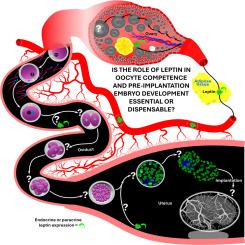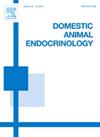瘦素在哺乳动物卵母细胞发育能力和胚胎着床前发育中的作用
IF 2.1
2区 农林科学
Q2 AGRICULTURE, DAIRY & ANIMAL SCIENCE
引用次数: 0
摘要
瘦素主要参与能量稳态,并与生育有关。瘦素和瘦素受体缺乏的小鼠模型表明,中枢神经系统中瘦素信号的表达对排卵至关重要。然而,从反刍动物和其他物种收集的具有生理瘦素信号的模型证据表明,尽管瘦素的调节影响卵巢类固醇生成和卵泡生成,但可能在青春期后个体的排卵中不起主要作用。体外研究表明,瘦素浓度在10和100 ng/ml之间可能不一致地促进不同物种的卵母细胞成熟。然而,大多数家畜研究报告只有在浓度高于卵泡液的情况下才有积极作用,这引发了对这些发现的生理相关性的质疑。同样,在人类中,卵泡液中瘦素水平与卵母细胞成熟的相关性不一致,进一步质疑瘦素在减数分裂完成中的作用。在瘦素或其受体的零突变模型中,瘦素的表达是植入前发育所必需的,但似乎不是植入所必需的。此外,关于瘦素在不同物种卵母细胞成熟和着床前发育过程中的介导作用的相互矛盾的体外数据,并不支持瘦素在卵母细胞形成囊胚的能力或早期胚胎向囊胚阶段的进展中发挥重要作用。总体而言,尽管瘦素的存在对排卵和着床前发育至关重要,但其在生理瘦素信号传导下的调节似乎对囊胚形成的影响微乎其微,这表明瘦素在哺乳动物生殖中起着不可或缺的作用。本文章由计算机程序翻译,如有差异,请以英文原文为准。

The role of leptin in mammalian oocyte developmental competence and pre-implantation embryo development
Leptin is primarily involved in energy homeostasis and has been implicated in fertility. Leptin- and leptin receptor-deficient mouse models have demonstrated that expression of leptin signalling in the central nervous system is essential for ovulation. However, evidence from ruminants and other species gathered from models with physiological leptin signalling suggests that modulation of leptin may not play a major role in the attainment of ovulation in post-pubertal individuals, despite influencing ovarian steroidogenesis and folliculogenesis. In vitro studies indicate that leptin concentrations between 10 and 100 ng/ml may inconsistently enhance oocyte maturation across several species. However, most livestock studies report positive effects only at concentrations higher than those found in follicular fluid, raising questions about the physiological relevance of these findings. Similarly, in humans, leptin levels in follicular fluid show inconsistent correlations with oocyte maturation, further questioning the role of leptin in the completion of meiosis. In null mutant models of leptin or its receptor, leptin expression is required for pre-implantation development but does not appear to be essential for implantation. Furthermore, contradictory in vitro data on leptin-mediated effects during oocyte maturation and pre-implantation development across various species do not support an essential role of leptin in the ability of oocytes to form a blastocyst or in the progression of early embryos to the blastocyst stage. Overall, while the presence of leptin is crucial for ovulation and pre-implantation development, its modulation under physiological leptin signalling appears to have a minimal impact on blastocyst formation, suggesting a dispensable role in mammalian reproduction.
求助全文
通过发布文献求助,成功后即可免费获取论文全文。
去求助
来源期刊

Domestic animal endocrinology
农林科学-奶制品与动物科学
CiteScore
5.50
自引率
4.80%
发文量
58
审稿时长
31 days
期刊介绍:
Domestic Animal Endocrinology publishes scientific papers dealing with the study of the endocrine physiology of domestic animal species. Those manuscripts utilizing other species as models for clinical or production problems associated with domestic animals are also welcome.
Topics covered include:
Classical and reproductive endocrinology-
Clinical and applied endocrinology-
Regulation of hormone secretion-
Hormone action-
Molecular biology-
Cytokines-
Growth factors
 求助内容:
求助内容: 应助结果提醒方式:
应助结果提醒方式:


